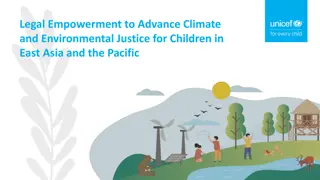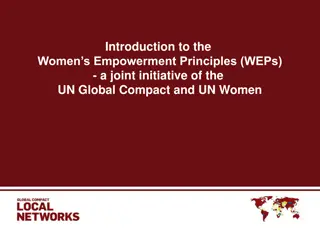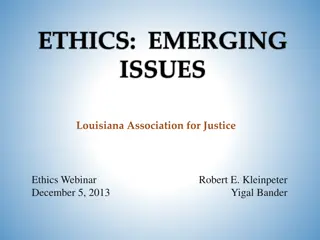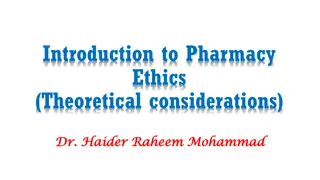Exploring Accountability and Ethics in Legal Empowerment
Dive into an immersive learning experience focusing on accountability and ethics in legal empowerment. From guided meditation to reflective walks and discussions on consent and confidentiality, this event offers a unique opportunity to engage deeply with important issues in the field. Join us for a day of reflection, dialogue, and connection.
Uploaded on Sep 12, 2024 | 0 Views
Download Presentation

Please find below an Image/Link to download the presentation.
The content on the website is provided AS IS for your information and personal use only. It may not be sold, licensed, or shared on other websites without obtaining consent from the author. Download presentation by click this link. If you encounter any issues during the download, it is possible that the publisher has removed the file from their server.
E N D
Presentation Transcript
Legal Empowerment Learning Lab 2020-2021
Today: Accountability and Ethics 1. Opening Meditation 2. Tea Time 3. Reflective Walk in a Photo Gallery 4. Ethics in PAR: Consent, Confidentiality, Safety and Care 5. Break 6. Spider Web: Faces of Power 7. Closing Circle 8. One Word
Opening Meditation Photo: Wapichan wiiz (Indigenous Wapichan territory), Guyana
Have you ever been involved in a research process? Who did you feel had more power? How did it feel? If you would change one thing in the research process, what would you change? Tea Time
Accountability and Ethics What are the pictures telling us?
Consent has been given. But what does the picture tell us?
And what it this picture telling us?
Constructing Constructing Knowledge Knowledge
Research Ethics in PAR Consent, Confidentiality, Safety and Care Photo: community co-learning workshop on the right to water in Cadouche, Haiti, 2018
What do you think of when you hear the phrase research ethics?
Research ethics bound up in extractive & abusive research Research on enslaved people and colonized Research on enslaved people and colonized populations was at heart of US and European populations was at heart of US and European medical and social science for centuries medical and social science for centuries Settler colonialists experimented on Native Settler colonialists experimented on Native American/First Nations communities. In US, American/First Nations communities. In US, continued unjust experiments through the Indian continued unjust experiments through the Indian Health Service Health Service Colonial medicine often entailed forced Colonial medicine often entailed forced examinations and research and experimental examinations and research and experimental treatments treatments This context often forgotten through colonial This context often forgotten through colonial unknowing (Sheeva Sabati) unknowing (Sheeva Sabati)
Calls for Accountability Led to Changes in Research Ethics Calls for Accountability Led to Changes in Research Ethics Nazi science Nazi science Nuremberg War Crimes Trials Nuremberg War Crimes Trials Decolonization Decolonization Postcolonial Research Ethics Postcolonial Research Ethics U.S. Pub. Health Svc. syphilis study U.S. Pub. Health Svc. syphilis study Belmont Report; IRBs Belmont Report; IRBs But the background power dynamics and forces of oppression remain. But the background power dynamics and forces of oppression remain. Example: U.S. Torture Program used experimental forms of torture on Muslim men between 2002 Example: U.S. Torture Program used experimental forms of torture on Muslim men between 2002- -2008 2008
Core Elements of Modern Research Ethics o Respect for persons Respect for persons Respect for autonomy Respect for autonomy Protection for those with diminished Protection for those with diminished autonomy autonomy o Beneficence o Beneficence Do no harm Do no harm Maximize benefits Maximize benefits Minimize harms Minimize harms Informed Consent Informed Consent o Information o Information o Comprehension o Comprehension o Voluntariness o Voluntariness o Justice o Justice Who enjoys the benefits of research Who enjoys the benefits of research Designed to deal with most severe abuses Designed to deal with most severe abuses-- --but at an individual level And without disrupting structural violence, injustice, and ongoing harm And without disrupting structural violence, injustice, and ongoing harm but at an individual level
How might Research Ethics be different in PAR?
Some ways research ethics are different in PAR PAR begins with the ethics the community already has PAR begins with the ethics the community already has No research subjects No research subjects all are co in research in research all are co- -researchers or partners researchers or partners Research is aimed directly at benefiting those conducting Research is aimed directly at benefiting those conducting the research the research it s not only about knowledge, but also it s not only about knowledge, but also about shifting power & seeking justice about shifting power & seeking justice Ethics are important for community as a whole, not only Ethics are important for community as a whole, not only individuals individuals Ethics are woven throughout the PAR process Ethics are woven throughout the PAR process PAR s ethics take into account structural injustice and PAR s ethics take into account structural injustice and seek to shift power seek to shift power
Creating an Ethics Protocol If PAR is built on the ways communities already care for each communities already care for each other, can we identify those caring other, can we identify those caring ways, amplify them, and agree to ways, amplify them, and agree to them as guiding our PAR? them as guiding our PAR? If PAR is built on the ways What is an Ethics Protocol? What is an Ethics Protocol? Some communities already have Some communities already have formal protocols or IRBs formal protocols or IRBs What are some elements to consider What are some elements to consider for inclusion and how might they be for inclusion and how might they be re/envisioned in PAR? re/envisioned in PAR? Photo: Juan Arredondo/Getty Images/Images of Empowerment
At the end of the Research Project, all data shall be given to the Navajo Nation Data Resource Center. (Intellectual & Cultural Property owned by the Navajo Nation) https://www.nnhrrb.navajo-nsn.gov/aboutNNHRRB.html
Forces that Trap Us During PAR: Faces of Power The Story of Amina
Example: What Killed Amina? Making Visible a Web of Injustice and Systemic Violence Type here Gender-Based Violence Lack of Water Type here Type here Type here Type here Type here Type here Type here
title words words words























